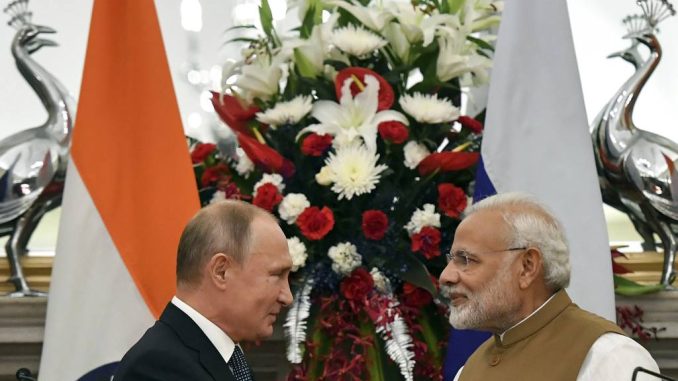
WASHINGTON ― The Biden administration has taken further steps aimed at Russia’s defense industry, announcing sanctions Wednesday that could affect not only Russia, but countries that rely on its military hardware.
The measures, triggered by Moscow’s war against Ukraine, target both Russia and its ally Belarus, which has been a staging ground for the invasion. The White House said sanctions on Russia’s defense sector would “impose significant costs on Russian weapon development and production companies.”
Russia is the world’s second-largest arms exporter after the U.S., averaging more than $13 billion in reported annual sales, according to the Congressional Research Service. On Wednesday, a U.S. State Department official told lawmakers it is unlikely Russia will be able to make new sales or provide maintenance to customers for existing systems.
“My view is that it’s going to be very hard for anyone to buy major weapon systems from Moscow in the coming months and years, given sweeping financial sanctions that the administration, with the support of Congress has leveled,” said Donald Lu, assistant secretary of state for South and Central Asian Affairs, told a Senate Foreign Relations subpanel.
“If you don’t have a banking system, it’s very hard for other countries to pay millions of dollars, rubles, yen or in Euros to pay for these defense systems,” Lu said.
Russia exports a majority of its arms to five states: Algeria, China, Egypt, India, and Vietnam. India has been the largest importer of Russian arms since 2016.
The comments came at a hearing on the U.S. relationship with India, which has been weaning itself off Russian military equipment but inked a multibillion-dollar deal for Russia’s S-400 Triumf missile systems in 2018.
RELATED
:quality(70)/cloudfront-us-east-1.images.arcpublishing.com/mco/GL2XCTV4WRAHFC25IOHXT5H47U.jpg)
As the U.S. strengthens its ties to India as a pivotal regional counterweight to China, the Biden administration has delayed enforcement of a law ordering sanctions on any country trading with Russia’s defense and intelligence sectors.
Lu noted that India had recently cancelled orders of Russian MiG-29 fighter aircraft, helicopters and anti-tank weapons, and he projected that the new sanctions would motivate other countries to do likewise.
“I do think many countries that have these legacy Russian systems will be worried ― not only worried about buying new fancy systems like the S-400, but we’re just talking ammunition, spare parts, basic supplies for Russian legacy systems that they already have.”
India drew criticism from Republicans and Democrats at the hearing because India was among 35 nations that abstained Wednesday from a U.N. vote to rebuke Russia’s invasion.
Among the Biden administration actions Wednesday, the State Department sanctions target 22 Russian entities that make combat aircraft, infantry fighting vehicles, electronic warfare systems, missiles, and unmanned aerial vehicles for Russia’s military.
Commerce Department export controls target oil and gas extraction equipment as well as entities that supported Russian and Belarusian security forces or their research and development efforts. The intent is to block Russian aerospace, maritime and tech sectors from U.S. goods to support Russian innovation.
“This action will help prevent diversion of items, technologies, and software through Belarus to Russia and will significantly degrade both countries’ ability to sustain their military aggression and project power,” the White House said.
The U.S. also formally imposed the sanction President Joe Biden announced Tuesday to block Russian aircraft of all kinds from U.S. airspace, a step also taken by much of Europe.
Joe Gould is senior Pentagon reporter for Defense News, covering the intersection of national security policy, politics and the defense industry.



Be the first to comment